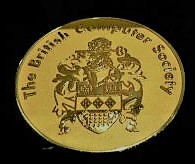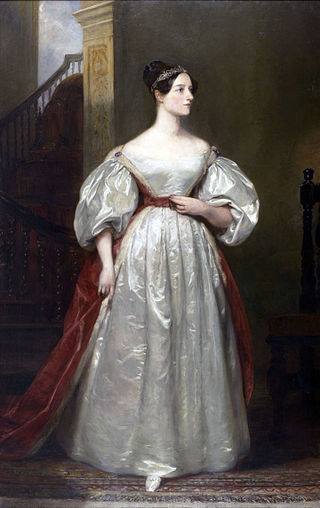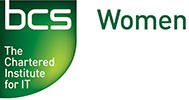
Augusta Ada King, Countess of Lovelace was an English mathematician and writer, chiefly known for her work on Charles Babbage's proposed mechanical general-purpose computer, the Analytical Engine. She was the first to recognise that the machine had applications beyond pure calculation.

The British Computer Society (BCS), branded BCS, The Chartered Institute for IT, since 2009, is a professional body and a learned society that represents those working in information technology (IT), software engineering and computer science, both in the United Kingdom and internationally. Founded in 1957, BCS has played an important role in educating and nurturing IT professionals, computer scientists, software engineers, computer engineers, upholding the profession, accrediting chartered IT professional status, and creating a global community active in promoting and furthering the field and practice of computing.

The Lovelace Medal was established by the British Computer Society in 1998, and is presented to individuals who have made outstanding contributions to the understanding or advancement of computing. It is the top award in computing in the UK. Awardees deliver the Lovelace Lecture.
A Master of Mathematics degree is a specific advanced integrated Master's degree for courses in the field of mathematics.

Women in computing were among the first programmers in the early 20th century, and contributed substantially to the industry. As technology and practices altered, the role of women as programmers has changed, and the recorded history of the field has downplayed their achievements. Since the 18th century, women have developed scientific computations, including Nicole-Reine Lepaute's prediction of Halley's Comet, and Maria Mitchell's computation of the motion of Venus.
The British Colloquium for Theoretical Computer Science (BCTCS) is an organisation, founded in 1985, that represents the interests of Theoretical Computer Science in the UK, e.g. through representation on academic boards and providing commentary and evidence in response to consultations from public bodies. The BCTCS operates under the direction of an Organising Committee, with an Executive consisting of a President, Secretary and Treasurer. The current President is Barnaby Martin.

Dame Wendy Hall is a British computer scientist. She is Regius Professor of Computer Science at the University of Southampton.

Karen Spärck Jones was a self-taught programmer and a pioneering British computer scientist responsible for the concept of inverse document frequency (IDF), a technology that underlies most modern search engines. She was an advocate for women in the field of computer science. She even came up with a slogan: “Computing is too important to be left to men.” In 2019, The New York Times published her belated obituary in its series Overlooked, calling her "a pioneer of computer science for work combining statistics and linguistics, and an advocate for women in the field." From 2008, to recognize her achievements in the fields of information retrieval (IR) and natural language processing (NLP), the Karen Spärck Jones Award is awarded to a new recipient with outstanding research in one or both of her fields.

Susan Elizabeth Black is a British computer scientist, academic and social entrepreneur. She is known for saving Bletchley Park, with her Saving Bletchley Park campaign. Since 2018, she has been Professor of Computer Science and Technology Evangelist at Durham University. She was previously based at the University of Westminster and University College London.

Doron Swade MBE, born 1944, is a museum curator and author, specialising in the history of computing. He is especially known for his work on the computer pioneer Charles Babbage and his Difference Engine.

Marta Zofia Kwiatkowska is a Polish theoretical computer scientist based in the United Kingdom.
Karen Petrie is a British computer scientist specialising in the area of constraints programming. She was named young IT practitioner of the year by the British Computer Society (BCS) in 2004, for work she carried out whilst on placement at NASA. She is currently a professor in the School of Science and Engineering at the University of Dundee.
Cornelia Boldyreff is very active in encouraging girls into computing, is a Council Member of The BCS, The Chartered Institute of IT, a Committee member of the BCSWomen and a visiting professor in the School of Computing and Mathematical Sciences at the University of Greenwich in London.

Hannah-Mary Dee is a British cognitive scientist and computer scientist specialising in computer vision, with specialisms in plant science, navigation, art, and medical imaging. In 2014, she was one of 30 women identified by the British Computer Society in the "BCS Women in IT Campaign.

Margaret Ross MBE, FBCS is an Emeritus Professor of Software Quality at Southampton Solent University. She serves on the BCSWomen Committee of the British Computer Society.

Gillian Arnold is a British Information technology leader. She is a BCS Vice President and the Past Chair of the BCSWomen Specialist Group that supports women in the IT industry. In 2015, she was identified as the 9th Most Influential Women in UK IT 2015, by Computer Weekly. In 2016, Arnold was again identified as one of the 50 most influential women in UK IT 2016 by Computer Weekly.

The National Center for Women & Information Technology (NCWIT) is a 501(c)(3) nonprofit organization that works to increase participation of girls and women in computing. NCWIT was founded in 2004 by Lucinda (Lucy) Sanders, Dr. Telle Whitney, and Dr. Robert (Bobby) Schnabel. NCWIT is headquartered in Boulder, Colorado at the University of Colorado Boulder. Lucy Sanders, who was inducted into the Women in Technology International Hall of Fame in 2007, is the current chief executive officer.

Gender disparity in computing concerns the disparity between the number of men in the field of computing in relation to the lack of women in the field. Originally, computing was seen as a female occupation. As the field evolved, so too did the demographics, and the gender gap shifted from female dominated to male dominated. The believed need for more diversity and an equal gender gap has led to public policy debates regarding gender equality. Many organizations have sought to create initiatives to bring more women into the field of computing.

The Ada Lovelace Award is given in honor of the English mathematician and computer programmer, Ada Lovelace, by the Association for Women in Computing. Founded in 1981, as the Service Award, which was given to Thelma Estrin, it was named the Augusta Ada Lovelace Award, the following year.

Adele Mildred Koss, known as Milly Koss, was an American pioneering computer programmer. The Association for Women in Computing awarded her an Ada Lovelace Award in 2000.
















